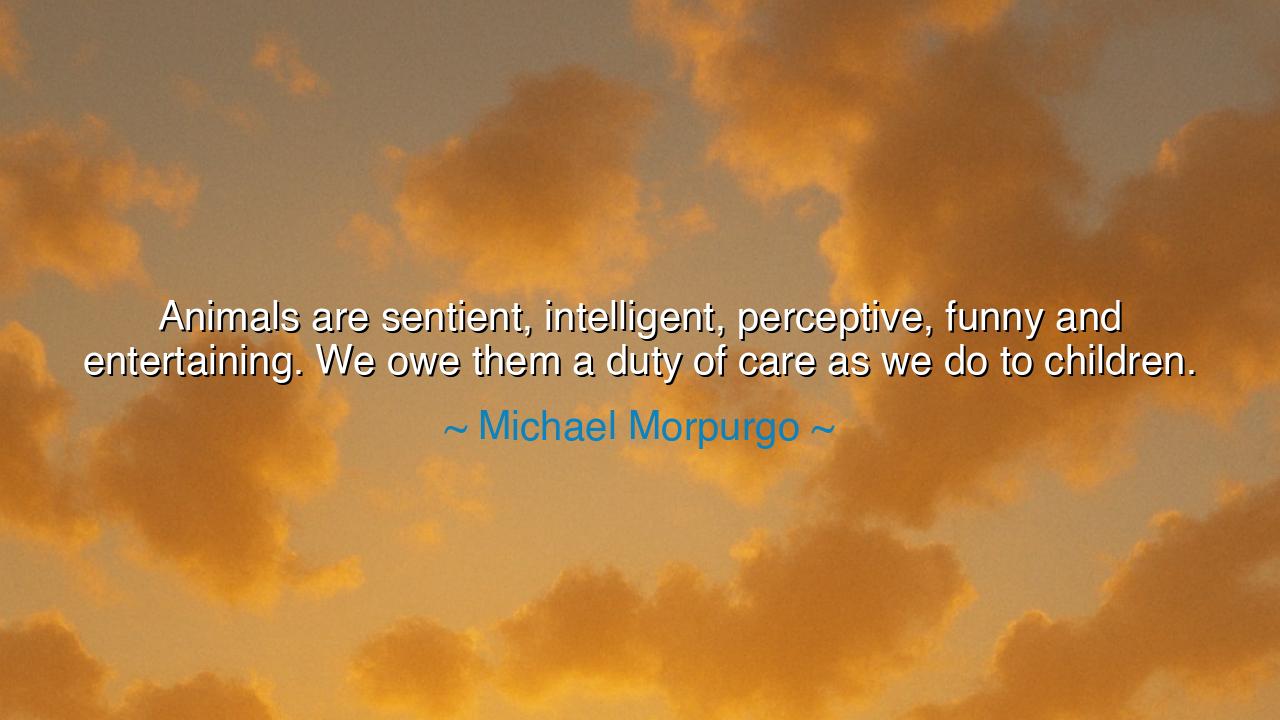
Animals are sentient, intelligent, perceptive, funny and
Animals are sentient, intelligent, perceptive, funny and entertaining. We owe them a duty of care as we do to children.






“Animals are sentient, intelligent, perceptive, funny and entertaining. We owe them a duty of care as we do to children.” — Michael Morpurgo
In these tender and truthful words, the writer Michael Morpurgo — a storyteller whose tales often bridge the hearts of humans and beasts — reminds us of an ancient covenant: the bond between man and animal. His words are not merely about kindness, but about recognition — recognition that animals are sentient, that they feel as we feel, that their joys and fears echo the pulse of our own souls. The ancients once believed that to understand nature was to understand the divine, and so too must we learn again to look into the eyes of the creatures who share this earth and see there a reflection of ourselves.
To call animals intelligent and perceptive is to admit that the world hums with awareness beyond human speech. Long before man built temples or cities, he walked among wolves, horses, and birds. They were his teachers and his companions. They warned of danger, guided his migrations, and shared his hunger. The old tribes of the earth — the Lakota, the Inuit, the Celts, and many more — knew this truth: that all living beings are kin, bound not by domination but by mutual care. To wound the beast was to wound the balance of the world. In time, humanity forgot. Yet, even now, as Morpurgo reminds us, the ancient duty still calls to our conscience.
Consider the story of Greyfriars Bobby, the faithful little dog of Edinburgh. When his master, a poor shepherd, passed away, Bobby remained by the man’s grave — through storms, through hunger, through long years — until he himself died of age and devotion. For fourteen winters, the townsfolk watched him keep his vigil. They brought him food, built him shelter, and in doing so, they learned from him the lesson of love unspoken. Bobby was no philosopher, no scholar — yet his loyalty taught humanity about fidelity more powerfully than any sermon could. This is the kind of sentience and perception that Morpurgo speaks of: not intellect alone, but heart — a living awareness of connection.
And what of the duty of care? It is no light command. To care for an animal is not merely to feed or shelter it, but to honor its right to exist in freedom and dignity. The farmer who tends his oxen with patience, the child who feeds the stray in the alley, the rescuer who risks life to save a whale tangled in nets — all serve this sacred duty. In the eyes of the ancients, such acts were not sentimental; they were holy. For they understood that mercy toward the voiceless is the measure of a soul’s greatness. As the sage Pythagoras once said, “As long as man continues to be the ruthless destroyer of lower living beings, he will never know health or peace.”
To say that animals are funny and entertaining is to recognize their spirit, their playfulness — a spark of divine joy that brings laughter to our weary hearts. Watch a dolphin dance through the waves or a kitten chase the dust in the sunlight, and you will glimpse something pure, untouched by greed or hatred. Their joy is ancient — the joy of existence itself. In their play, they remind us of innocence, of the child within us who once saw wonder in every living thing. Thus, Morpurgo’s comparison — that we owe them care as we do to children — is not mere poetry. It is moral truth. For both depend on us not for dominance, but for guidance and compassion.
The origin of this wisdom lies deep in the shared breath of creation. We and the animals are born of the same earth, shaped from the same dust, warmed by the same sun. The same life force flows through our veins and theirs — the pulse of being that beats beneath fur, feather, and skin alike. To deny their sentience is to blind ourselves to our own. When we recognize their intelligence, we awaken to the harmony that sustains all things. When we neglect them, we break that harmony and invite sorrow upon ourselves and the world.
So, my child, take this teaching to heart: the beasts of the earth are not beneath you — they are beside you. Let your heart grow gentle toward them. Feed the hungry stray. Protect the forests and the seas, for within them live the ones who trust us silently. Teach your children not only to love animals but to respect them — as living beings with purpose, awareness, and feeling. The laughter of a bird, the gaze of a horse, the trust of a dog — these are sacred gifts, threads in the grand tapestry of life. To harm them is to unravel that tapestry; to care for them is to strengthen it.
And remember always: true strength is not shown in mastery, but in mercy. To live wisely is to live kindly — to walk this world with open eyes and a tender hand, knowing that every creature, great and small, shares in the mystery of being. This is the duty of care that Morpurgo speaks of — not a burden, but a blessing. For in honoring them, we honor life itself.






AAdministratorAdministrator
Welcome, honored guests. Please leave a comment, we will respond soon